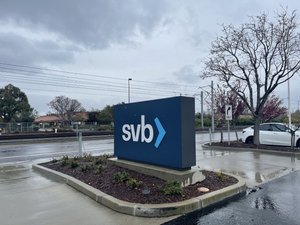
David Johnson had just landed in Tokyo with his family for a celebratory vacation, and they were en route to Nagano when the news started rolling in about SVB's collapse.
Four days earlier, he closed a seed round for his young biotech startup, GigaMune, which is developing gene therapies for rare diseases.
The plan was to diversify GigaMune's banking services, eventually, but by Friday morning, it was too late. The startup's funding — in the seven digit range — was suddenly frozen, including $600,000 of Johnson's personal money that he had contributed to the seed round.
Johnson got on the first flight back to California to deal with the unfolding crisis.
"The timing was about as awkward as you can get," Johnson told me. "Literally, I just got the last check in on Monday, and then by Friday, I had no access to any of my funding."
He couldn't log in into GigaMune's SVB account. The company's credit cards and debit cards had stopped working, too. Over the weekend, all he could do was sign petitions, email the White House and hope that everything would get resolved as quickly as possible.
Then Sunday evening, federal officials announced that all deposits at SVB would be covered beyond the FDIC's typical $250,000 guarantee.
"There was a collective sigh of relief," Johnson said. "And then, you know, we started thinking, OK, what next? How do we get our money out? Everybody is trying to walk in and get wires and set up your bank account" at new institutions, all at the same time.
By Monday morning, he was able to log in and initiate wire transfers to new accounts he had set up at JPMorgan Chase and Bank of America. The transactions were still pending as of late morning.
Getting the funds out of SVB was just the first step, though. GigaMune has 120 vendors that Johnson will have to work with to update their account info, including employee benefits like payroll.
Making sure his three employees get paid is a priority, Johnson told me. Some vendors will understand that GigaMune can't pay its bills on time but other will start charging fees or interest.
"We're moving our money to 'too big to fail banks.' And those banks are not known for moving quickly," Johnson said. "If we're made whole or mostly whole and that happens over the next week or two, we'll figure the rest out. Maybe I need to pay a fine to the state because our payroll is late. Maybe we'll get reimbursed for that eventually, I don't know. But we'll survive it and then we'll be able to concentrate on our science."
Things will hardly be back to normal, though, and while switching to the "too big to fail" banks provides desperately needed security right now, it also presents its own challenges that Johnson just didn't have to deal with at SVB.
"Working with bigger banks is probably going to be pretty frustrating," Johnson said. "They just don't understand what a startup is. They ask you questions like, 'Are you an owner?' What does that even mean? … Their support staff aren't even really trained on basic startup concepts."
Smaller, regional banks just don't feel like a viable option, either.
"How can you take that chance?" Johnson said.
Despite everything, he doesn't blame SVB.
"SVB is getting a lot of blame. And I don't think they handled messaging very well," Johnson said. "I think a lot of the fault lies with some large actors who just decided they were gonna do a run in the bank and everybody kind of followed them. Your leadership matters."
If you've been affected by SVB's collapse, please reach out to Sara Bloomberg at sbloomberg@bizjournals.com.








